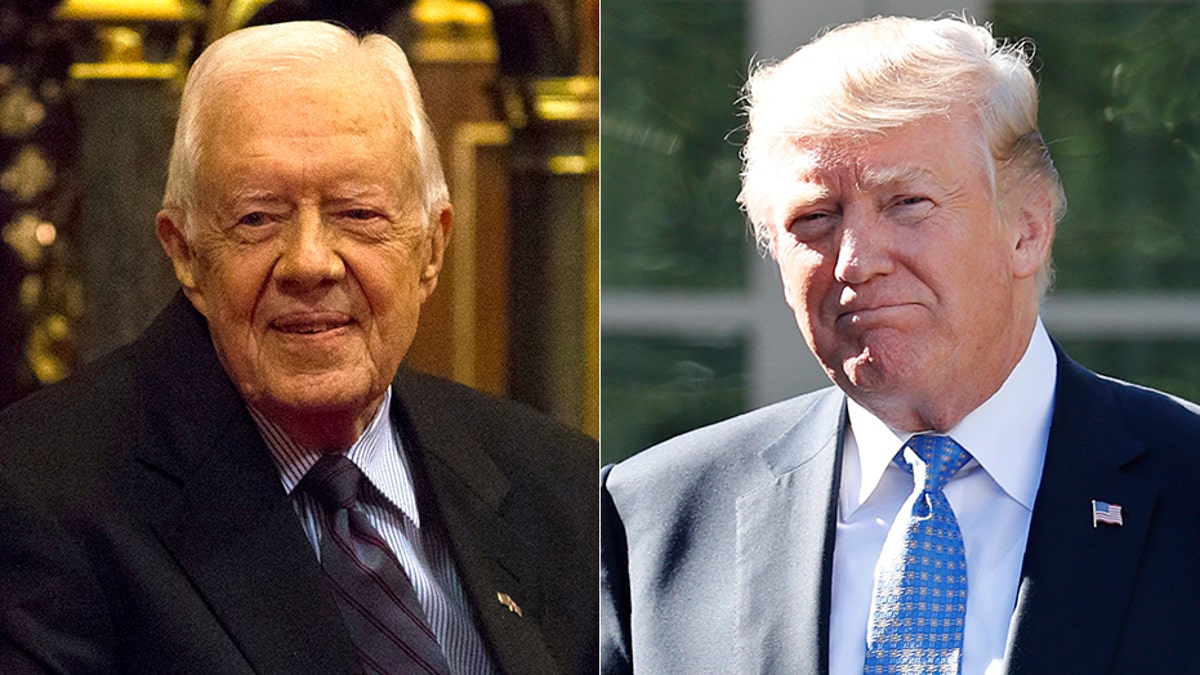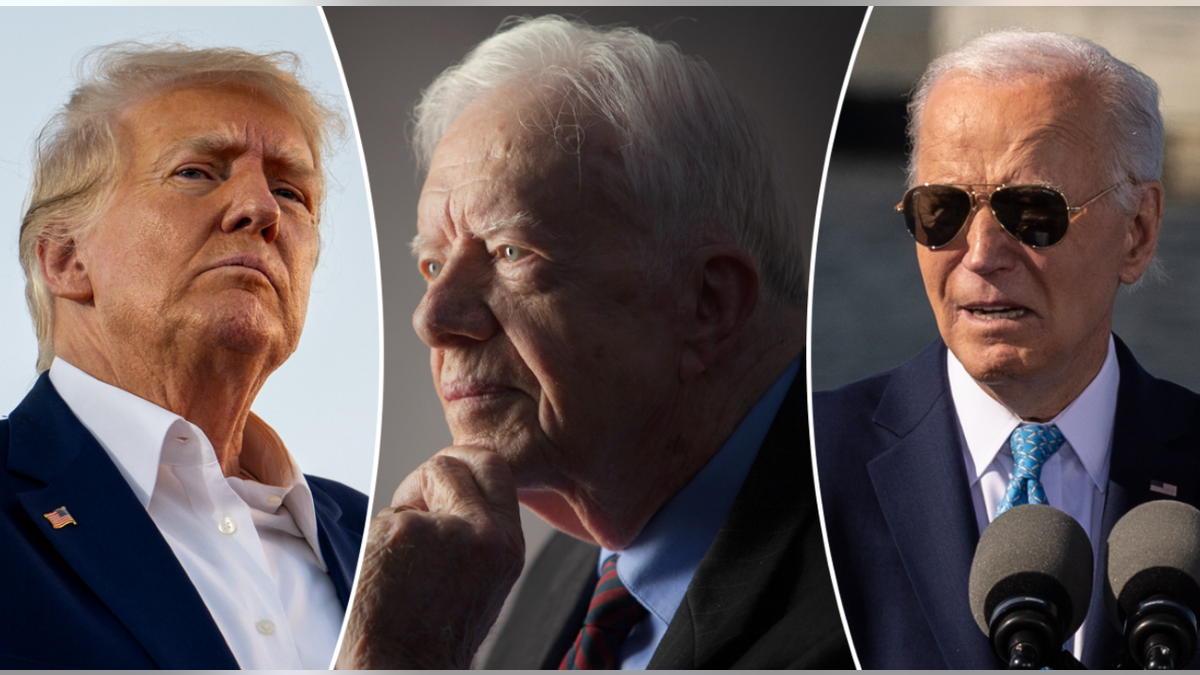Trump's Unexpected Condolences: What's Behind The Jimmy Carter Comments?
Did the death of Jimmy Carter, at the remarkable age of 100, truly soften the often-caustic rhetoric of Donald Trump? The surprising display of respect, even if qualified, following Carter's passing on December 29, 2024, offers a glimpse into the complexities of political relationships and the evolving dynamics of public discourse.
On Sunday, the news of former President Jimmy Carter's death, a milestone marked by his incredible longevity, prompted a reaction from an unexpected quarter: Donald Trump. This response, delivered via his Truth Social platform, was a notable departure from the animosity that often characterized their interactions. The statement, while acknowledging philosophical and political disagreements, expressed a degree of respect that, at first glance, seemed out of sync with their historical exchanges. This unexpected turn of events highlights the nuanced nature of political rivalries and the often-shifting landscape of public sentiment.
| Jimmy Carter: A Biographical Overview | |
|---|---|
| Full Name | James Earl Carter Jr. |
| Born | October 1, 1924, in Plains, Georgia |
| Died | December 29, 2024 |
| Spouse | Rosalynn Smith Carter (married 1946, until her death in 2023) |
| Children | John William "Jack" Carter, James Earl "Chip" Carter III, Donnel Jeffrey "Jeff" Carter, Amy Lynn Carter |
| Education | United States Naval Academy, B.S. |
| Military Service | United States Navy (1946-1953) |
| Political Party | Democratic |
| Political Offices Held |
|
| Post-Presidency | Activist, Author, and Humanitarian. Founded The Carter Center, focused on human rights and peace. |
| Awards and Honors | Nobel Peace Prize (2002) |
| Reference | The Carter Center |
The history between Trump and Carter was, to put it mildly, complex. Trump, in his characteristic style, had often used Carter as a foil, particularly during the 2024 campaign. During a campaign stop in Waunakee, Wisconsin, Trump had drawn a comparison between Carter and his successor, Joe Biden, stating that the former made Biden look "brilliant." This type of comparison was not isolated; Trump had repeatedly mocked Carter to rally supporters, using the former president's perceived weaknesses as a means to strengthen his own image. This behavior was a recurring theme, highlighted by his comments on Carter's 100th birthday in October.
Trump's rhetoric toward Carter, before and during the 2024 campaign, was often marked by sharp criticism. He did not shy away from directly attacking Carter's legacy or his perceived failures, using these criticisms to underscore his own strengths and the perceived weaknesses of his political opponents. This included comments made on the campaign trail, and in interviews. This pattern of behavior, while consistent with Trump's approach to political rivals, made his recent show of respect all the more striking.
The contrast between Trump's past actions and his recent statement is stark. Before the 2024 election, Trump had repeatedly attacked Carter during campaign events. He seemed to relish the opportunity to draw a comparison between Carter and Biden, always in a way that diminished Carter's accomplishments and amplified his own perceived successes. He even went so far as to joke about Carter's passing in 2014, when the former president was very much alive. This behavior was in stark contrast to the official statement that followed Carters death, a statement that, while nuanced, nonetheless acknowledged Carters service.
The official statement on Truth Social, however, offered a different tone. "President Jimmy Carter is dead at 100 years of age," Trump wrote. "While I strongly disagreed with him philosophically and politically, I also realized..." This statement, although containing the usual caveats about their disagreements, also included an acknowledgment of Carter's life and service. This shift, even if subtle, caught the attention of many observers.
The shift in tone might be attributed to several factors. Perhaps it was a recognition of the gravity of the situation, a desire to appear respectful in the face of death, or a strategic calculation about public perception. Whatever the motivation, the statement stood in marked contrast to Trump's past behavior, creating a moment of surprise and reflection.
This reaction was particularly noteworthy considering the political context. The 2024 election was a highly charged and divisive affair. Trump had consistently targeted Carter, leveraging the former president's perceived vulnerabilities to rally his base. The fact that he chose to soften his stance, even slightly, after Carters death is a testament to the ever-changing nature of political communication.
Interestingly, there was a brief moment of cordiality between the two men. In 2019, Carter sent Trump a letter praising his efforts in establishing relations with China. It was a rare instance of positive interaction, a temporary truce in what had often been a contentious relationship. This demonstrates the possibility of finding common ground, even between political adversaries.
The timing of Carters death, at the age of 100, is significant. He earned the title of the longest-living president in U.S. history, leaving behind a legacy of service and humanitarian work. He dedicated his post-presidency to human rights advocacy and peace efforts through The Carter Center. Trump's statement, even with its qualifications, acknowledged this legacy.
The reaction to Trump's comments also provides insight into the evolving attitudes of his supporters. While many were surprised by the relatively positive tone, others saw it as a calculated move, an attempt to appear gracious while maintaining his critical stance. This division highlights the complex and often contradictory nature of political affiliations.
The death of Carter, and Trump's response to it, offers an opportunity to consider the legacy of the 39th President. He was a man of strong convictions, who devoted his life to public service. His accomplishments, including the Camp David Accords and his post-presidency work, are a testament to his commitment. The contrast between his legacy and Trump's criticisms underscores the impact of individual political views.
The fact remains, however, that their relationship was primarily characterized by criticism and opposition. In 2014, Trump made a joke about Carter's death, highlighting their past animosity. This stands in stark contrast to the official statement following his passing. The difference between the jesting and the formal acknowledgment demonstrates the evolution of public opinion.
The juxtaposition of these contrasting reactions offers a lesson in the nature of political discourse. Political figures often engage in tough and sometimes even harsh rhetoric. But the final judgment is often more complicated, colored by respect for basic human dignity.
The comments made in Waunakee, Wisconsin, in October, are a clear example of Trump's use of Carter as a political tool. By positioning Carter in contrast to Biden, Trump was able to elevate his own image by devaluing the former presidents work. This was a tactic designed to energize his supporters and amplify his core message. He found his own success through diminishing the perceived successes of others.
The recent outpouring of support for Carter, from all across the political spectrum, underscores the value of his contributions. This respect and appreciation is in stark contrast to the jabs and mockery he received in the years leading up to his death. It is a stark reminder of how public perception can change.
This episode is a reminder that political relationships are rarely simple. They are filled with complexity, marked by personal histories, and influenced by the prevailing political climate. The response to Carters passing serves as a reminder of the capacity for change in even the most contentious of political relationships.
The remarks on Truth Social, no matter how measured, represent a significant step in the ongoing saga of this relationship. The response shows that even the most acrimonious political rivalries can be touched by respect. It shows the need for recognizing the humanity of even the most ardent political opponents.


